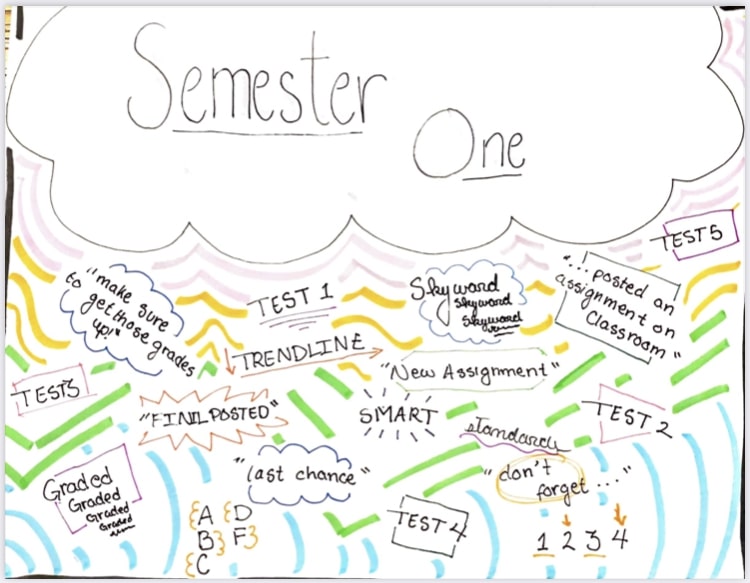Students reflect on stress leading up to
semester grades
By Daalny Meyer, Reporter

As the first semester of the school year comes to a close, many students feel the pressure of grades more than ever. During the weeks between the end of winter break and the end of the semester, students receive more tests and assignments that can push their grades one way or the other, especially because of the gradebook trendline. This can cause an increase in stress that students have different ways of managing as the semester ends.
Standards-based grading allows for more retakes, an important part of improving and maintaining grades for many students, but can also create more stress during the end-of-semester period. Ava Woo, a senior this year, has noticed this.
“I think with standards based grading, it definitely puts [on] a little more pressure, because if your trendline all of a sudden drops, it drops your grade a lot,” Woo said.
The trendline aspect of standards-based grading can help students in many ways, but sophomore Liv Ormseth has also noticed the stress that can come with an unpredictable trendline towards the end of the grading period.
“Some teachers put large tests really close to the end of the semester, which makes it unclear if your grade could suddenly drop and you won’t be able to fix it,” Ormseth said.
In addition to the standards-based trendline, the amount of support teachers offer, or are able to offer, differs considerably.
“Some teachers just say things like ‘It’s the end of the semester, make sure you get your grades up’ but they don’t actually give you opportunities to improve,” Ormseth said.
Junior Ninabelle Mullins has found that teachers acknowledge the end-of-semester stress, and will offer support outside of class, but it is up to the students to reach out in most cases.
“Teachers can only do so much for each student, so I think it’s up to you to tell them what you need help with or what you need to get done,” Mullins said. “Most of the teachers I’ve had make it easy to come in and work, and they’re able to help take steps to get better grades as long as you are willing to put effort in.”
Throughout highschool, Woo has found that the amount of support offered is different depending on the teacher and the class, especially at the end of the semester.
“It definitely varies,” Woo said, “I think some teachers who like to have finals aren’t as considerate. [But] teachers who kind of wind down or [are] already transitioning to the other semester [haven an] easier-to-handle workload.”
Some teachers change class schedules slightly towards the end of the semester to give students the chance to improve their grades. However, this is not always helpful on a large scale because of the grading trendline.
“A teacher has added an extra test, because people wanted to raise their grade,” Woo said, “But [how helpful it is] depends on where your grade is. If you liked your grade, that’s kind of a detriment, but if you want an opportunity to raise it, it’s beneficial.”
As the years continue, students have found different strategies for dealing with grade improvements and the stress that comes at the end of the semester. In most cases, simply finding time to talk with teachers helps students sort out what needs to be worked on in order to get their desired grade.
“I’ve gone into a lot of classes and looked at the grade book with my teachers,” Mullins said. “They’ve been able to tell me what I need to improve on and what I can do, which helps me develop a plan. Talking to teachers is super helpful, [and using] SMART!”
Similarly, Woo has found that talking with specific teachers can help organize the chaotic end-of-semester workload.
“Retesting or reaching out to make sure that there’s going to be opportunities to make sure I want my grade to be where it is [is useful],” Woo said.
In addition to talking with teachers, Ormseth has found that checking Skyward has been very helpful in managing the stress.
“I look at my grades in Skyward, and then make a list of the classes with teachers who are going to give us potentially grade-changing assignments, and those are the only classes I will worry about,” Ormseth said. “I still work hard in the others, but it lets me narrow them down in my mind.”
Over all, the end of the grading period can be a stressful time for many students, and this stress can be
increased or decreased depending on the amount of support and understanding offered by teachers.
“I think some teachers offer really great support, and they allow students to retake tests or assignments,” Ormseth said, “To me, that shows that the teacher really prioritizes the students learning the material over anything else. I think that is really important, because the objective is for the student to learn the material, and if it takes until the end of the semester, that should still be fine.”
